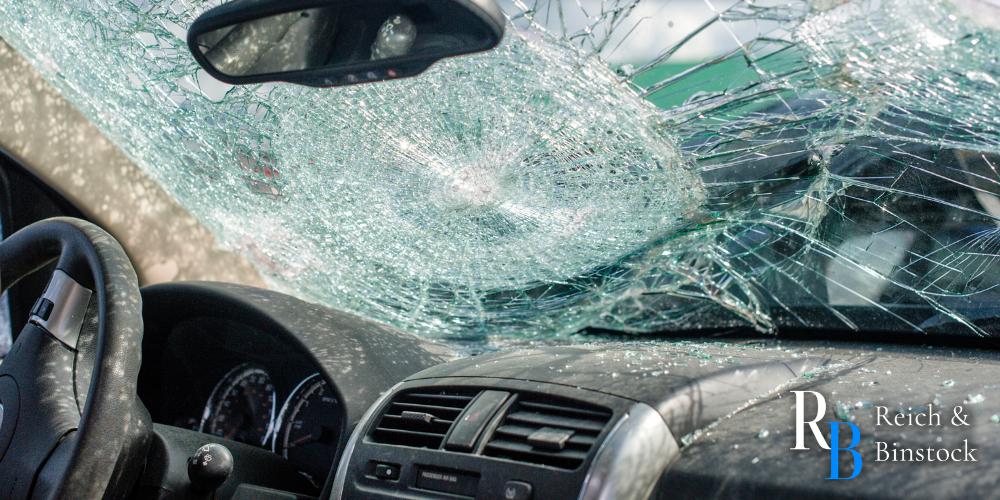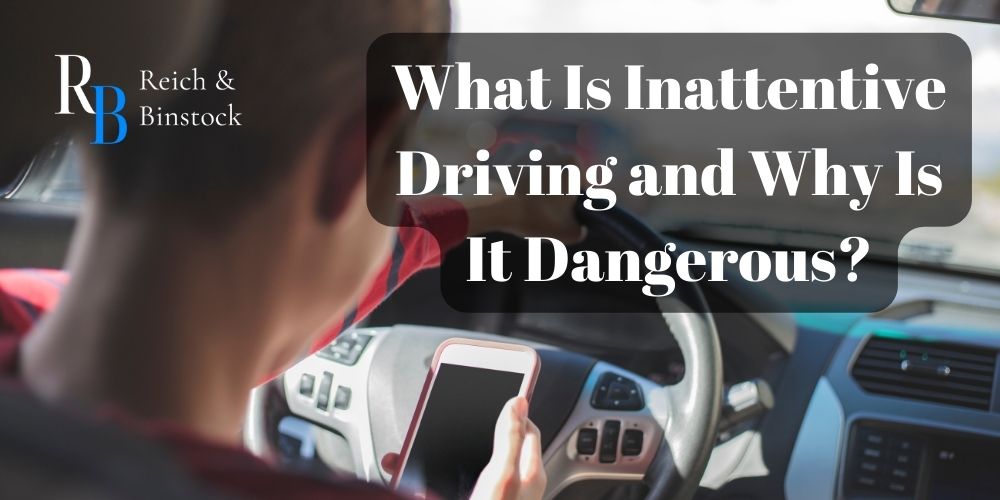Most people understand the concept of distracted driving, but did you know that inattentive driving can be just as deadly? Distracted and inattentive driving are often used interchangeably, but they are two different things. Driver inattention behind the wheel is dangerous and has the potential to cause serious car accidents. Victims in these accidents deserve compensation for their injuries.
If you suffered injuries from the actions of a distracted driver or inattentive driver, the legal team at Reich & Binstock is here for you. Our Houston car accident attorneys are skilled in litigating on behalf of personal injury victims, and we have decades of experience in the Texas legal system. To schedule a free consultation with us, please call our office at 713-622-7271 today.
What Is Inattentive Driving?
Inattentive driving is a form of distracted driving that occurs when a driver does anything that takes their attention and eyes away from being an alert driver. Common examples of inattentive driving include adjusting the radio, using a cell phone, adjusting the temperature, applying makeup, and even talking to other people.
Cell phones are one of the most notorious forms of distraction for drivers, but they are not the only culprit. Daydreaming and highway hypnosis are other, less conscious ways that distracted drivers can have their attention taken from the road. Regardless of what specific distractions there are, inattentive drivers have a significantly increased risk of causing accidents.
Inattentive Driving Accident Statistics
In Texas and across the country, driver inattention is one of the leading causes of motor vehicle accidents. According to the NHTSA, distracted driving resulted in 3,522 deaths in fatal crashes in 2021 alone. So many of these unnecessary losses could have been prevented by simply paying attention to the road.
How Are Inattentive Driving and Distracted Driving Different?
Distracted driving and inattentive driving sound very similar, but they have slight differences. Although they both have the same potential consequences, the terms refer to different types of driver distraction. Inattentive driving can also be considered a form of distracted driving.
Distracted driving refers to tangible distractions, such as cell phone use, talking on the phone, or eating. Inattentive driving refers to intangible things that may take the driver’s attention away from the road. Examples include beautiful landscapes or daydreams about upcoming vacations.
Forms of Inattentive Driving

Drivers must pay attention to the road visually, cognitively, and manually in order to safely operate a motor vehicle. If an inattentive driver fails to do this, serious car accidents could occur. Below, we outline the three types of driver inattention and examples of each.
Cognitive Inattention
Cognitive inattention and cognitive distractions involve losing focus on the task at hand – driving. Most people think of cell phones as the principal culprit behind distracted driving accidents. However, wandering minds can do just as much damage.
Examples of Cognitive Inattention
Cognitive distraction examples include the following.
- Daydreaming
- Thinking about one’s personal or work life
- Talking to passengers
- Listening to music or singing
- Talking on the phone
Visual Inattention
Visual distractions are those which take the driver’s eyes off the road. Looking away for even a split second is long enough to cause an accident. A visual distraction could be either inside or outside of the vehicle.
Examples of Visual Inattention
Common examples of visual distractions include the following.
- Billboards
- People in other vehicles
- Looking at the vehicle gauges
- Looking at passenger in the vehicle
- Checking the rearview mirror and side mirrors
- Looking at a GPS
Manual Inattention
Manual distractions are those which cause the driver to take their hands off the steering wheel. As with visual and cognitive distractions, taking one’s hands off the steering wheel for even a split second can lead to an accident.
Examples of Manual Inattention
Common examples of manual distractions include the following.
- Taking off a coat or jacket
- Eating or drinking
- Applying makeup
- Adjusting the seat or mirrors
- Meddling with the GPS or radio
- Smoking
- Reaching for something
Why Is Inattentive Driving Dangerous?

Safe driving requires a driver’s full cognitive, manual, and visual attention. A lapse in one of these for a split second is enough to result in a serious accident. Inattentive drivers can harm not only themselves, but also their passengers and people in other vehicles. So, what exactly makes these distractions so dangerous?
Inattentive or distracted drivers could make the following mistakes while driving.
- Missing changes in the speed limit in school or construction zones
- Missing an exit or crossing over multiple lanes of traffic to make the exit
- Failing to notice important road signs
- Missing hazards or debris in the road
- Rear-ending another vehicle due to inattention
- Causing an accident at an intersection because of failure to yield
- Failing to hear the sirens of approaching emergency vehicles over loud music
- Missing flashing lights or school bus stop signs
- Swerving into an adjacent or oncoming lane of traffic
- Running off the road
- Inadequate surveillance while merging onto a roadway
Do I Need an Attorney After an Inattentive Driving Accident?
Yes. We strongly recommend seeking help from a seasoned car accident attorney if you or someone you love has been injured due to inattentive or distracted driving. It only takes an instant for driver inattention to cause an accident, and the resulting damages could be catastrophic.
Those who have been injured or who have lost loved ones from distracted driving have the right to file personal injury claims. However, these cases are often very complicated, and they can be difficult to navigate without professional legal help. Working with an attorney will ensure that you have the best possible chance of obtaining full and fair compensation for your losses.
What Compensation Can I Get for My Injuries?
If you have suffered injuries or lost a loved one due to driver distraction, you deserve fair compensation. Car accidents can greatly range in severity, but victims deserve compensation for the damages they suffered. After an inattentive driver causes an accident, you may be entitled to the following forms of compensation.
- Current and future medical bills
- Current and future lost wages
- Loss of earning capacity
- Property and vehicle damages
- Pain and suffering
- Emotional distress
- Scarring or disfigurement
- Funeral and burial expenses
A skilled personal injury lawyer can evaluate your claim and ensure that your voice is heard while fighting for compensation. We can help you determine the value of your claim, as well as help you navigate the legal process.
Contact the Houston Distracted Driving Accident Lawyers at Reich & Binstock Today
While many people associate distracted driving with young drivers and cell phones, anyone can make the mistake of inattentive driving. Regardless of age or the type of distraction, one’s driving performance and reaction times can be significantly reduced and raise the risk of accidents. If you or someone you love suffered injuries in a car accident caused by driver distraction or inattention, you may have a case.
Contact the Houston personal injury lawyers at Reich & Binstock by calling 713-622-7271 to schedule your free consultation.














